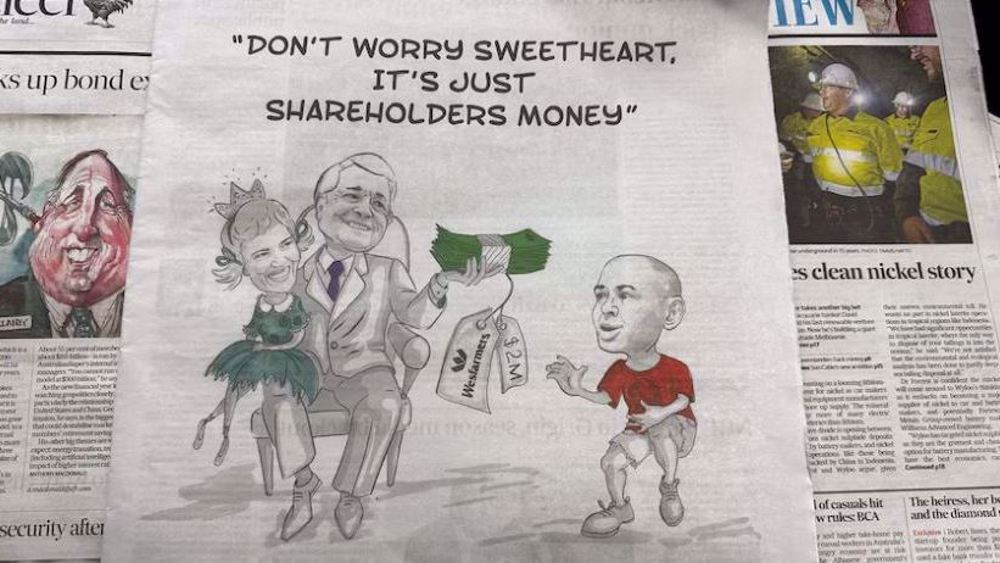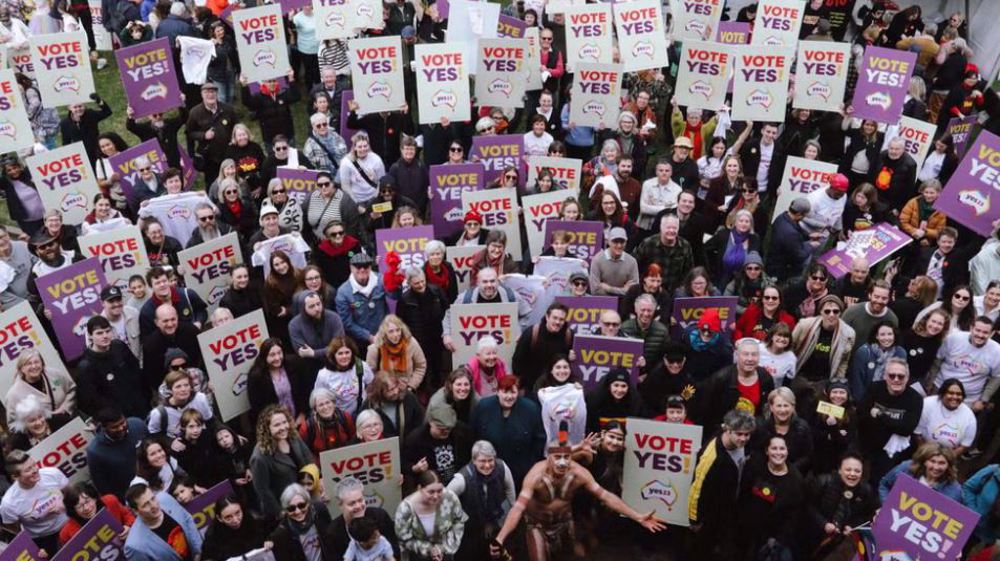Australian daily publishes 'racist' advertisement against Indigenous population
A major Australian media house has published a full-page "racist' advertisement disparaging the country’s Indigenous people in its daily newspaper.
The Australian Financial Review owned by Nine Entertainment - a media conglomerate - was widely slammed on Thursday as "racist" and "discriminatory" for its derogatory treatment of the country’s native population.
This comes at a time when Australians will be voting in a referendum later this year on whether they support altering the constitution to include a "Voice to Parliament," an Indigenous committee that can advise the parliament on matters affecting its Aboriginal and Torres Strait Islander people.
The advertisement in the daily depicts Independent Australian MP Kate Chaney sitting on the knee of her father, Wesfarmers Chairman Michael Chaney, while he hands money to Thomas Mayo, a leader of the Indigenous population, who appears to be standing below him.

Wesfarmers, an Australian conglomerate, has supported the Indigenous referendum.
Bunnings, owned by Wesfarmers, was criticized by the Australian opposition leader, Peter Dutton, for donating to the Indigenous campaign.
“I don’t want to, every time I hand over my credit card or cash at Bunnings, or at Coles, I don’t want part of that money going to an activist CEO,” Dutton said.
The Indigenous Australians minister, Linda Burney, on Wednesday said that the Fair Australia campaign, a drive against the “Indigenous Voice to Parliament,” was seeking to mislead voters.
Following severe public backlash the owner of the Australian Financial Review issued a retraction.
The advertisement "should not have run and we apologize for it," a spokesperson for media company Nine, owner of the newspaper, said in a statement.
This is not the first time that Indigenous Australians have been portrayed controversially in the media. In 2016, racist cartoons depicting the Aboriginal people stroke debate over abuse of the Australian natives.
“It's disappointing to see the “No” campaign stooping to personal and racist attacks when Australians are more interested in learning the facts about the Voice and how it can contribute to Closing the Gap," Kate Chaney said in a statement, ABC News reported
Ultimately, I think people will vote in the referendum based on what is fair and useful, not based on fear and hate,” she added.
The “No” campaign is a voice against granting rights to Aboriginal Australians.
The proposal on changing the constitution to include the native Australians will be put up for referendum between October and December this year. It plans to establish an advisory body - “the Indigenous Voice to Parliament” - aiming to give Aboriginal and Torres Strait Islander people a direct say in the policies that affect them.
It is important to mention that several rallies were held on Sunday across Australia, following a recent dip in support for the constitutional change guaranteeing rights to Indigenous Australians.
The government of Australian Prime Minister Anthony Albanese supports the change; however, there are many opposition parties objecting to the proposal.
The opponents of the proposal have argued that the move lacks details and will lead to division among Australians.
Surprisingly the constitution of Australia does not recognize the country's Indigenous population.
The government needs to secure a double majority in the referendum, which equals 50 percent of votes nationwide to grant the Indigenous people a say in the parliament.
Indigenous Australians form the most disadvantageous community in Australia, suffering higher rates of imprisonment, unemployment, illness and child mortality.
Aborigines comprise 3.2 percent of Australia's total population, while they make up 32 percent of all prisoners. In the past 30 years, more than 400 Indigenous people have died in police custody.
Many of these deaths have taken place in police custody under suspicious circumstances. Despite findings and recommendations from a national inquiry in 1991, no one has been convicted for the deaths.
Iran FM says to issue protest to Kuwait over US aircraft downing
IRIB chief says Tehran compound hit for third time in months; broadcasts continue
US-allied fuel tanker attacked by Iran still burning in Strait of Hormuz: IRGC
Attacks on hospitals, schools ‘strike at life itself’: Pezeshkian
Iran’s attacks on US bases ‘legitimate’ response to source of aggression: Araghchi
IRGC targets US intelligence centers, military depots in 11th wave of attacks
US-Israeli attacks damage 5 hospitals, medical centers in Iran: MP
Unlike US, Iran prepared for a long war: Security chief











 This makes it easy to access the Press TV website
This makes it easy to access the Press TV website